What Are The Best Herbs For Digestion Problems?
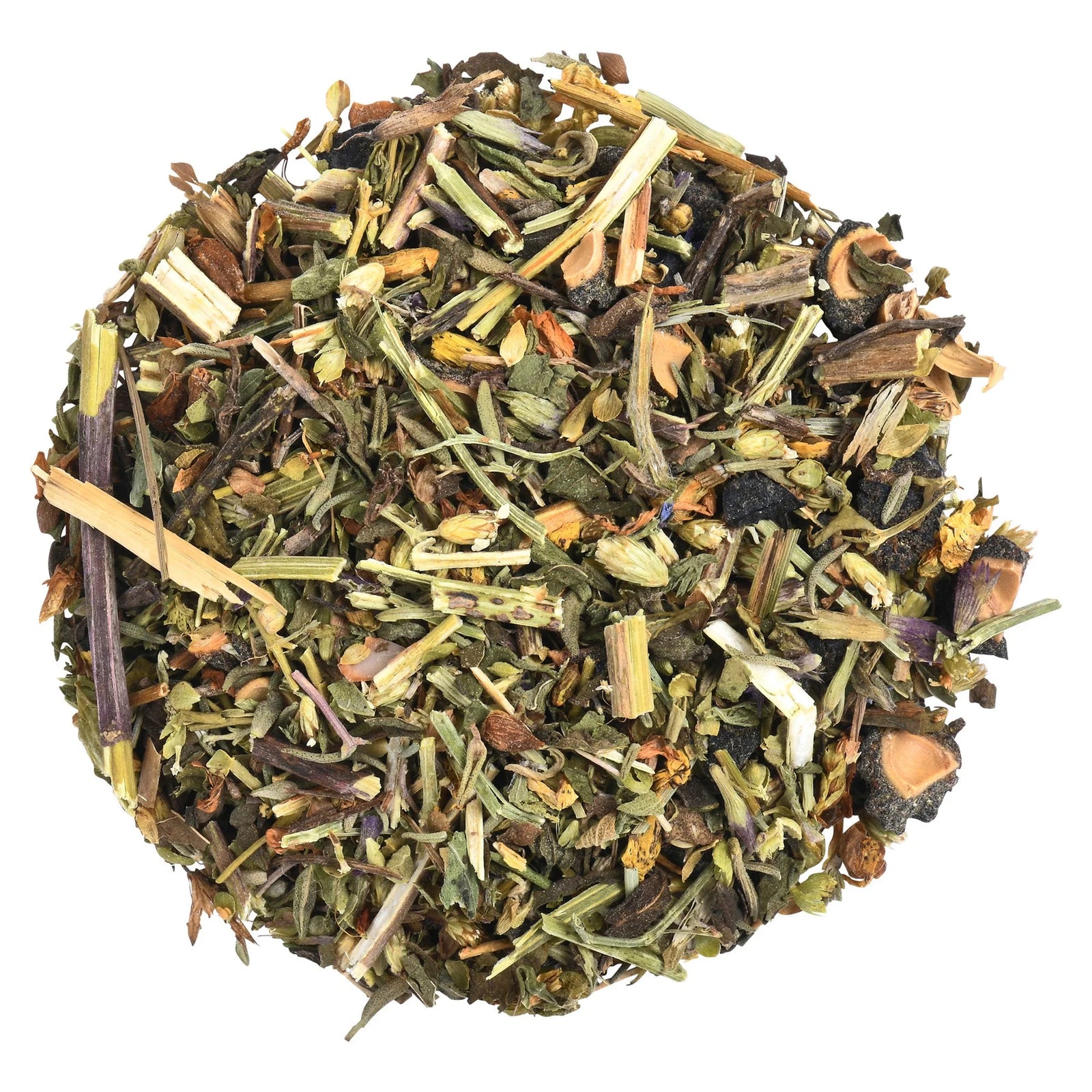
There s no shame in searching for best tea for acid reflux and bloating or teas for indigestion online. Considering 40% of Americans experience digestion problems daily, these are very common Google searches!
Digestion refers to all the steps involved with consuming food. From the mouth to the anus, the digestive tract is made up of digestive organs including the esophagus, stomach, intestines (small & large) and the pancreas, among others.
The process is not always that simple, though! If an issue affects how we absorb food, we call it a digestion problem. Some examples of digestion problems are:
- Nausea
- Bloating
- Diarrhea
- Vomiting
- Heartburn
- Constipation
- Trouble swallowing
- Weight gain or loss
- Stomach pain (eg: cramps or ulcers)
Along with these problems, trouble within the digestive tract can cause conditions like irritable bowel syndrome, lactose intolerance, hemorrhoids and gallstones.
Now, what causes digestive problems? There isn t only one cause for the problems listed here. However, they tend to be a result of stress, insufficient exercise and poor dietary habits (low fiber, too much dairy, etc).
Fortunately, there are countless teas that help with digestion! Here are our recommended herbs for digestion and bloating:
- Lovage (Levisticum Officinale)
- Rock Rose (Cistus Incanus)
- Knotgrass (Polygonum aviculare)
- Digestive Organic Blend
Let s start off with Lovage.
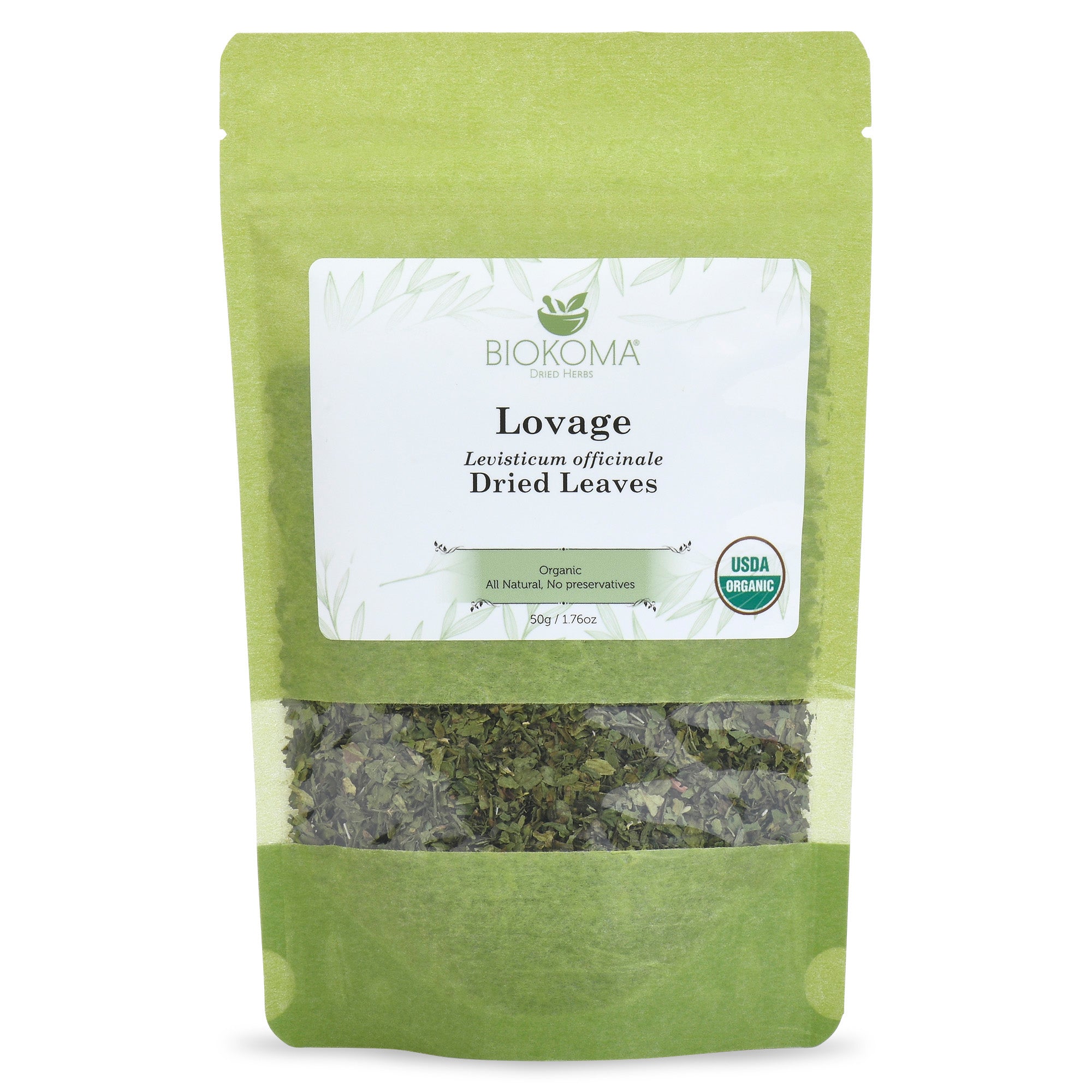
Photo of Biokoma s Lovage (Levisticum Officinale) herbal tea
#1: Lovage (Levisticum Officinale)
Many use Levisticum officinale to add flavor to their favorite soups, meats and dishes.
The lovage plant holds countless properties that make this tea good for digestion, too. Some of which are anti-dyspeptic (for indigestion), stomachic (for gut health) and carminative (for flatulence).
Some sources claim that herbalists used lovage for digestion problems traditionally. Users have reportedly relieved bloating, gas and indigestion from consuming it. But, this only scratches the surface for lovage medicinal uses!
It s best to note that some digestion problems can be a result of low stomach acid levels.
Stomach acid is known for aiding digestion by breaking down the food and killing any lingering bacteria. When stomach acid isn t in adequate amounts, your body will have trouble digesting meat and other protein-heavy foods.
Research has highlighted how lovage herb increases the production of saliva and gastric juice (ie: stomach acid). In turn, this ensures that food enters the mouth and leaves the digestive tract through the anus with ease.
Another notable benefit of lovage tea comes from its antioxidant content. By controlling inflammation, antioxidants protect the gut lining from damage. This makes it a great tea for gut health.
Some other lovage root benefits include:
- Treats heartburn
- Relieves joint pain and migraines
- Reduces irregular menstrual periods
- Gives flavor to foods and beverages
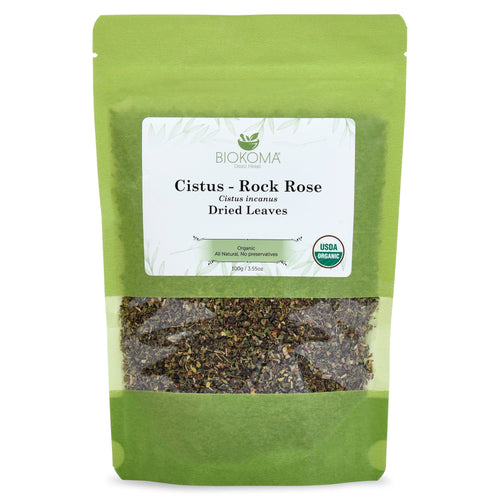
Photo of Biokoma s Rock Rose (Cistus Incanus) herbal tea
#2: Rock Rose (Cistus Incanus)
With its light pink flowers and green leaves, the hairy rock rose is widely recognized in herbal medicine as an immunity-boosting herb.
It also offers remedies for common digestive problems. Much of its benefits come from the properties found in its leaves and flowers.
One of the chemical components found in this plant is a polyphenol known as ellagic acid. The antioxidant properties found within it allows for cistus incanus to reduce flatulence. According to one study, consumption of ellagic acid also reduced symptoms of Irritable Bowel Syndrome (IBS).
Another benefit of cistus incanus for digestion comes from its antiulcerogenic properties. Any drug that treats ulcers in the stomach and/or intestines is considered an antiulcerant.
Stomach ulcers are sores that grow along the lining of the stomach. If left untreated, these ulcers can cause heartburn, nausea and indigestion. They tend to leave a burning and/or painful sensation in their wake. However, cistus incanus antiulcerogenic make it a viable treatment option!
Inflammation is another roadblock between healthy and unhealthy digestion.
When the stomach lining gets inflamed, sores can grow inside of the large intestine and rectum. Fortunately, the bioflavonoids found within cistus incanus reduce inflammation and the risk of Inflammatory Bowel Disease (IBD) - a condition that can bring on persistent diarrhea, fatigue and stomach pain.
Using rock rose for digestion is not the only way to reap cistus tea benefits:
- Increase metabolism
- Fights against bacteria
- Assists with weight loss
- Treats respiratory problems
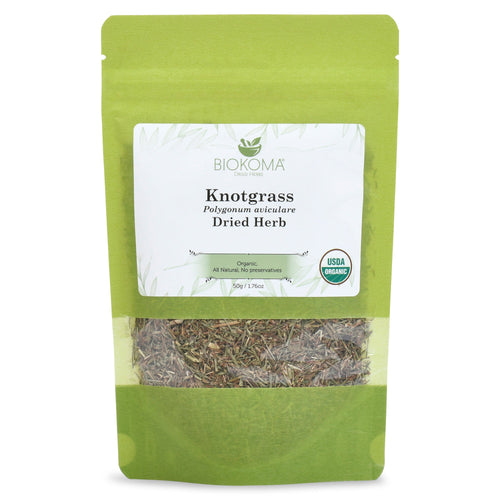
Photo of Biokoma s Knotgrass (Polygonum aviculare) herbal tea
#3: Knotgrass (Polygonum aviculare)
Polygonum aviculare was traditionally used to treat symptoms of the common cold as far back as the 1600s. However, modern medicine still points towards knotgrass many other uses, including uses against digestive problems.
When consumed, knotgrass can be taken as an astringent - That is, any drug or chemical that shrinks tissues and dries up bodily secretions. As an astringent, this herb is effective against diarrhea.
Inflammatory conditions like dysentery and enteritis are also treatable with the anti-inflammatory properties found in knotgrass herb. This is all thanks to its myricetin and flavonoid compounds!
Knotgrass is used to treat inflammation along the intestinal tract, which aids in lessening flatulence within the digestive system.
In promoting healthier digestion, knotgrass herb can also be used as a cholagogue. Typically, cholagogues target the gallbladder by allowing for bile (ie: fluid made in the liver) to reach the small intestine. Otherwise, poor bile flow may result in trapped gas, stomach cramps and diarrhea.
Some other benefits of knotgrass tea are:
- Used as a diuretic
- Treats hemorrhages
- Relieves coughing & congestion
- Removes mucus from nasal passages
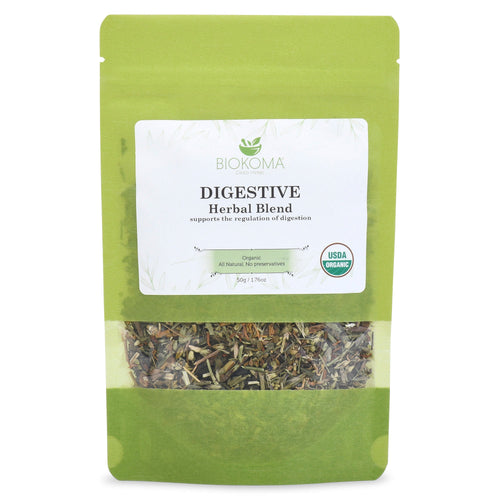
Photo of Biokoma s Digestive Organic Blend
#4: Digestive Organic Blend
What if there was a single tea that combined the best herbs for stomach problems?
Get the best of both worlds when you blend herbs and fruits into one infusion: Introducing Digestive Organic Blend.
Made from a combination of natural digestive teas, you can adequately reap the benefits of multiple teas. The following are only a few of the ingredients found in the package!
Yarrow Herb:
The flavonoids found within yarrow herb increase the production of saliva and stomach acid, thus making digestion as smooth as possible! It also relieves cramps in the stomach and intestines.
St John s Wort:
Consuming St John s wort herb has been proven to reduce the effects of diarrhea and bloating associated with Irritable Bowel Syndrome (IBS). Additionally, it can improve kidney and lung health.
Blackthorn Fruit:
Some reports highlight that blackthorn berries have mild laxative and diuretic properties. However, this fruit also improves digestion through reducing bloating, flatulence and constipation.
Oregano Herb:
While this herb is found in most kitchen cabinets, oregano is a strong contender for best herbs for digestion. Oregano can reportedly ease common digestive problems, like indigestion and stomach aches.
There are even more digestive herbs found in this exclusive blend - You can view them here!
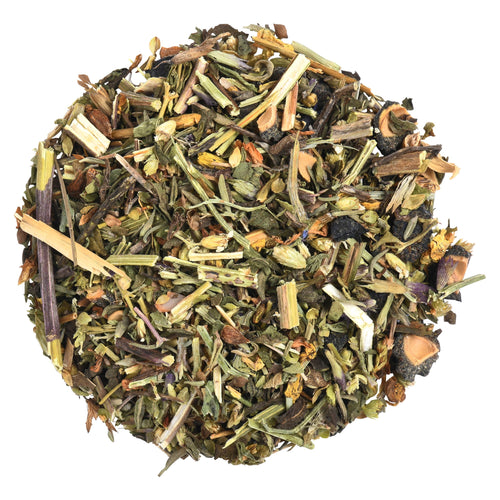
Photo of Biokoma s Digestive Organic Blend (herbal tea)
What Tea Is Good For Digestion and Bloating?
There are enough scientific studies to highlight just how potent herbs can be!
This means digestion teas are foolproof ways to target indigestion, bloating, upset stomach and gut health. To recap, we recommend picking any of the below as the best tea for digestion:
- Lovage (Levisticum Officinale)
- Rock Rose (Cistus Incanus)
- Knotgrass (Polygonum aviculare)
- Biokoma s Digestive Organic Blend
Some digestive problems are a result of low stomach acid level, which can be remedied by drinking Lovage (Levisticum officinale) Organic Dried Leaves. Along with that, lovage root can be used to relieve heartburn and improve overall gut health.
All the chemical components found in Rock Rose (Cistus incanus) Organic Dried Leaves make it effective against flatulence, stomach ulcers, inflammation and other digestive problems. Other benefits of cistus tea are improved metabolism and better weight loss.
With both anti-inflammatory and astringent properties, it s a no-brainer to use Knotgrass (Polygonum aviculare) Organic Dried Herb for better digestive health. Using knotgrass for digestion can effectively remedy diarrhea, trapped gas and stomach cramps.
So, what is the best herbal tea for digestion? A blend of herbs used for digestion, bloating, cramping and flatulence, of course! Consider Biokoma s Digestive Organic Blend to fit the benefits of multiple herbs (and fruit) into a single cup of tea.
Whichever herbal tea you pick, the benefits will likely leave some positive effects on your digestive tract!
FDA DISCLAIMER
These statements have not been evaluated by the FDA. These products are not intended to diagnose, treat, cure or prevent any disease. No known precautions. We recommend that you consult with a qualified healthcare practitioner before using herbal products, particularly if you are pregnant, nursing, or on any medications.
REFERENCES
Introduction:
https://gastro.org/press-releases/new-survey-finds-forty-percent-of-americans-daily-lives-are-disrupted-by-digestive-troubles/#
https://www.hopkinsmedicine.org/health/wellness-and-prevention/how-digestion-works#
Lovage (Levisticum Officinale):
https://www.drugs.com/npp/lovage.html
https://www.rxlist.com/lovage/supplements.htm
https://www.sciencedirect.com/topics/agricultural-and-biological-sciences/lovage
Rock Rose (Cistus Incanus):
https://www.ncbi.nlm.nih.gov/pmc/articles/PMC8975483/
https://www.ncbi.nlm.nih.gov/pmc/articles/PMC9032239/
Knotgrass (Polygonum Aviculare):
https://en.wikipedia.org/wiki/Polygonum_aviculare
https://www.asohm.com.au/ancient-current-uses-of-knotgrass/






